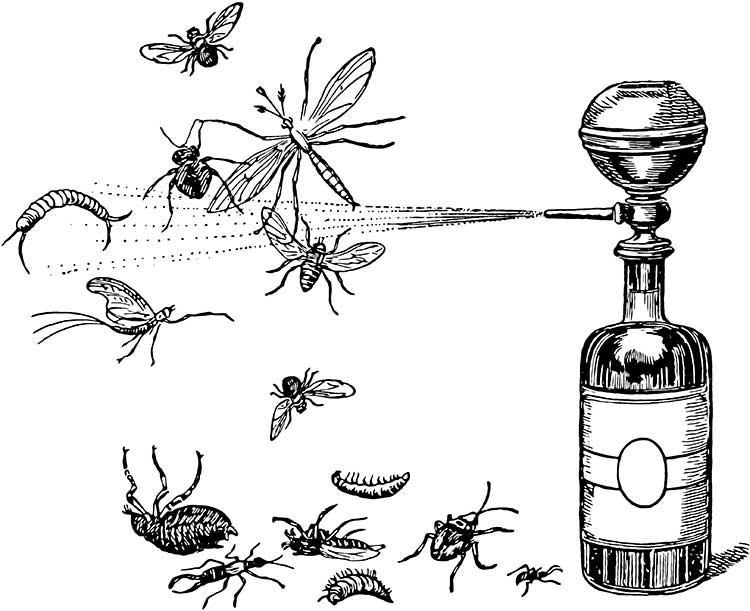How to Find a Good Exterminator
Last updated November 2024

The bad news? Climate change means that household pests, from rats to roaches, have extended breeding seasons. “Insects will activate earlier and will live longer than they did in the past,” said Michael J. Raupp (aka “The Bug Guy”), professor emeritus of entomology at the University of Maryland. “There will be more generations of mosquitoes, bark beetles, and other pests.”
The good news? You can still get rid of household menaces, in many cases on your own. And innovations in pest control—more baits and traps, fewer poisonous sprays—mean banishing bugs and rodents is safer than ever. Here are some tactics to stomp out pests on your own—and when to call an exterminator. (Hint—bedbugs and termites are tough enemies and usually require professional help.)
Start by Trying Easy Ways to Keep Pests at Bay
Knowing how to identify household pests, how they live, and how to get rid of them will help you figure out what you can DIY and how to choose professional help, if needed.
“It’s about integrating your pest control,” said Molly Keck, a Texas A&M AgriLife Extension entomologist specializing in pest management. “You need a combination of physical control, like caulking up cracks, and hygiene, so pests don’t have access to food and water sources. And if those things fail, pesticides are the smallest component.”
A few general steps will help you avoid or control most pests and, perhaps, avoid pesticides. “The trend is moving away from ‘spray and pray,’” said Keck. “The more you learn about pests’ behavior—what they’re getting into, where they are coming from—the better you can control them.”
After that, solutions depend on the specific pest. In this section of our website we profile the most common critters and how to crush them. Except for termites and bedbugs, you should be able to cure most pest problems without hiring a service.
If you must resort to chemical warfare, take proper safety precautions and find out about possible health effects. If you use a professional, determine upfront how long the house must be vacant after application and how long the chemicals will be potent. Be skeptical about safety claims, and insist that the exterminator follow precautions.
Tips for Working with Exterminators
If you have a problem you can’t handle on your own, pest control services can step in. We’ve rated several area companies, or branches of companies.
Ratings from Customers
Our Ratings Tables show how area consumers we surveyed rated the companies on several aspects of service.
We primarily surveyed Consumers’ Checkbook subscribers but also invited a sample of other area homeowners to participate, asking them to rate pest control companies they had used “inferior,” “adequate,” or “superior” for several questions, including: “doing work properly on the first try,” “promptness,” “advice on service options and costs,” and “overall quality.” For companies that received 10 or more ratings, our Ratings Tables report the percent of surveyed customers who rated each company “superior” (as opposed to “inferior” or “adequate”) on each question. Click here for more info on our surveys and research methods.
Some companies were rated “superior” by 90 percent or more of their surveyed customers. On the other hand, some others received such favorable ratings from fewer than 60 percent of respondents.
The most common complaint? Exterminators don’t show up for appointments. But other gripes detailed sloppily applied ineffective treatments, inept termite inspections, and salespeople who push expensive annual contracts.
Complaint Histories
Our Ratings Tables also report counts of complaints we gathered from the Consumer Protection Division of the Washington Office of the Attorney General for a recent two-year period and complaint rates relative to the volume of work companies do.
How They Approach the Problem
Different outfits have different strategies for treating, or preventing, pest problems—for example, baits versus sprays or long-term contracts versus one-time treatments. Some companies are flexible, but others offer just one approach.

Guarantees
Try to avoid payment until your pest control work is complete. For termite jobs, however, some firms require partial payment upfront.
Any company that guarantees either termite work or household pest treatment is likely to get your money before its obligations end. This means your protection is a written contract or receipt specifying the length and breadth of your guarantee.
Compare companies’ guarantees. For work with roaches and other pests, guarantees usually range from 30 days to one year. For termite work, some companies offer a single one-year guarantee, but most let you pay to extend it, charging an annual premium for a year’s extension of coverage and an inspection.
For both household pests and termites, guarantees generally cover continuing service to attack old infestations and new ones while the guarantee is in force. Some companies offer termite guarantees that also cover structural repairs.
Qualifications of Staff
The company you choose should send out well-trained pest control professionals. All companies must employ at least one person who has taken classes and passed a state test to qualify as a certified pest control applicator. But some companies have just one certified applicator and send out uncertified workers. If you need termite service, find out whether the company will send a certified structural pest technician who has met the training requirements and passed the test administered by the state.
Prices
You’ll find big price differences among qualified pest control outfits.
Compare them by getting free price quotes by phone, email, or in person. Most exterminators also give free termite control estimates, although they charge a fee for the formal paperwork required for inspections for real estate transactions.
Have roaches? On our Ratings Tables we report our price comparison score based on the quotes our undercover shoppers collected to treat a minor infestation in a single-family home. Our price comparison scores are intended to suggest the price a customer might expect to pay for pest control work that would cost $100 at the “average” company. A price comparison score of $110 for a company, then, means that its prices were about 10 percent above average; a score of $90 means that its prices were about 10 percent below average.
To calculate these scores, we used each company’s quoted prices for a one-time treatment for roaches, its charge for an initial treatment plus a follow-up treatment 30 days later, and its charge for an initial treatment plus a follow-up treatment 40 days later.
Some companies will let you pay for single treatments. Most offer contracts for regular treatment (usually monthly or bimonthly). Unless you have bedbugs or termites, we recommend individual treatments. But because most companies let you cancel their term contracts without penalty, compare the cost of one or two pay-as-you-go treatments with the cost of a service contract. Know that the least expensive plan is not always the first offered. Press companies to describe all the available alternatives.
If you have termites or bedbugs, you will need to price shop for yourself, since most companies won’t give quotes on treatment plans without onsite inspections. Exterminators charge drastically different prices to solve the same problems, so get at least three estimates. To treat a small termite infestation, one of our undercover shoppers received quotes ranging from less than $1,000 to more than $3,000.
Remember—our evaluations revealed no relationship between prices charged for household pest treatments and customer satisfaction. Several highly rated companies charge low prices, and several poorly rated companies charge high prices.


